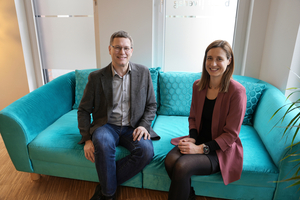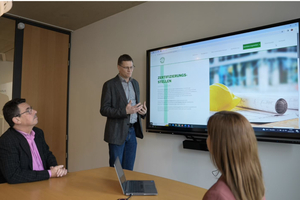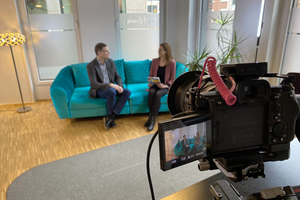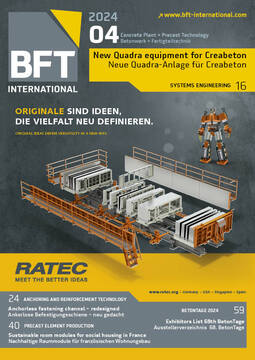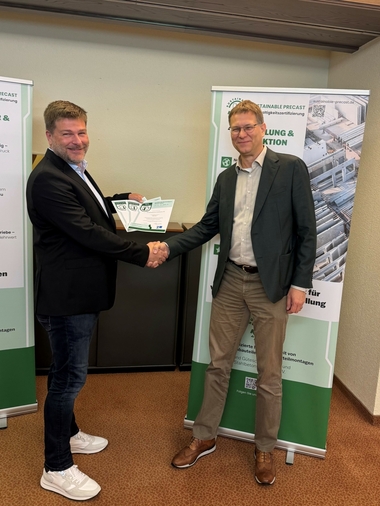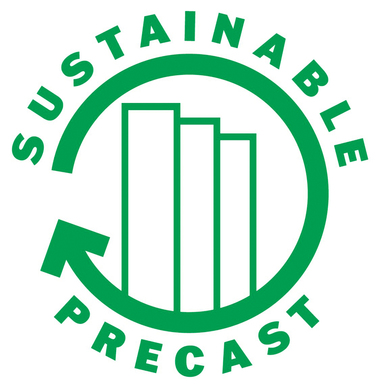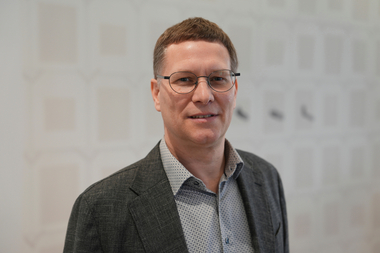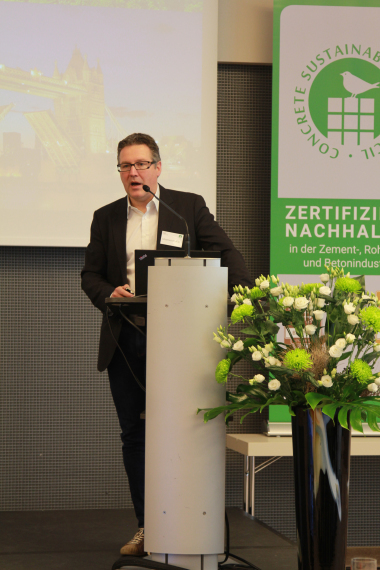Interview: “With SUSTAINABLE PRECAST we would like to support transformation in the industry”
The German government’s sustainability goals are ambitious. The concrete industry is a particular focus of attention. But what, exactly, does “sustainable” mean? For buildings especially, this question is not only of great significance, but is also difficult to answer. The new SUSTAINABLE PRECAST certification program is intended to support the industry on its way toward a sustainable future. The initiator, Dr.-Ing. Jens Uwe Pott, in the following interview with BFT International, explains the aim and the process toward SUSTAINABLE PRECAST certification.
BFT International: Welcome, Dr. Pott. I am very pleased to be able to ask you some questions about the new sustainability certification for the concrete industry. Why did you launch SUSTAINABLE PRECAST? What is the intention of the certification program?
Dr.-Ing. Jens Uwe Pott: Sustainable transformation of society is a central task for the next 20 to 30 years. Awareness of the need is by now widespread, also in the companies of the precast industry. over the past years, many companies have already made efforts for sustainability. But we are nevertheless standing at the beginning of a long and challenging process. With SUSTAINABLE PRECAST certification, our objectives are three-fold:
To enable companies to determine where they stand in sustainability
To provide companies with ideas on the next steps along this way
To enable companies that already achieve above-average performance in sustainability practice to facilitate communication of their accomplishments by independent evaluation and certification.
In other words, we want to support transformation of these companies, while continuing to encourage them to improve. For this reason, it is planned to successively adapt the requirements for certification to the progress that industry is making in the transformation process. A company that has received a certificate should not be encouraged to sit back and relax over the long run, but should continue to think about what it can do better in the future.
BFT International: The certificate for demonstration of sustainability in three areas relevant for concrete plants has been set up. What are these areas?
Dr.-Ing. Jens Uwe Pott: We focus on the performance spectrum of the companies in the precast industry. Most manufacturers of concrete components, both for structural elements and for concrete goods, manufacture their concrete and, of course, the concrete elements themselves. Some manufacturers of structural precast elements offer installation of the precast elements as well. For this reason, the certificate applies to the categories concrete, concrete elements and erection of precast elements. It is necessary to order only those categories for which the manufacturer is relevant. When a manufacturer obtains its concrete − e.g., from a certified ready-mixed concrete plant – the concrete need not be certified again. In these cases, comparable sustainability certificates for the concrete, such as the CSC certificate, can also be recognized. But we must be clear about one factor: when the concrete itself is not demonstrably sustainable, then the concrete elements are likewise also not sustainable.
BFT International: Are only ecological aspects relevant for SUSTAINABLE PRECAST?
Dr.-Ing. Jens Uwe Pott: No. Sustainability entails the best possible harmonization of social, ecological and economic requirements – including contradictory aspects. The economic requirements are usually taken into consideration by the companies themselves. We review adherence to the social and ecological requirements.
BFT International: We at BFT International have recently reported on this as well: the first certification centers have begun activity. Which ones are they? And what exactly is their task?
Dr.-Ing. Jens Uwe Pott: The first two certification centers are BAU-ZERT e.V. (www.bauzert.de) and argus CERT BAU GmbH (www.arguscertbau.de). The Quality Association Bund Güteschutz Beton- und Stahlbetonfertigteile e.V. has developed the SUSTAINABLE PRECAST system based on the relevant requirements and will in future continue to develop it further. Accordingly, it will lay down the rules for certification. The two certification centers − in the future, hopefully more − will then, based on these rules, carry out the audits and certifications at company sites. This means, in specific terms, that the certification centers will initially obtain a picture of the company’s performance in sustainability, backed up by the appropriate documents that the companies must submit. Often the companies will be asked to submit additional documents, for cases in which documentation is inadequate with regard to the one or other issue. If evaluation is positive, an audit will follow at the company site. On this occasion, final details are clarified and, most of all, verified as to whether the documents submitted are in line with corporate practice. When the auditor has become convinced that the company as a whole satisfies the requirements, he or she will prepare an audit report and submit it to the management of the certification center – where a decision on certification will be reached. Upon initial application, or if there are major changes to the requirements, this audit and certification process is very complex, since every requirement must be verified in detail. In the following years, a new audit will be performed every year, during which primarily specific changes will be reviewed: e.g., when suppliers or the production process changes. In addition, continued adherence to the requirements will be verified on a random basis. When everything is in order, the company receives confirmation that the prerequisites for certification are satisfied every year.
BFT International: What roles do neutrality and transparency play? Are these assured?
Dr.-Ing. Jens Uwe Pott: Yes, Bund Güteschutz places great stock on both neutrality and transparency. For this purpose, a separate Quality Committee for Sustainability has been established, which includes persons from various interested circles: e.g., individuals from IG Bau and BG RCI, freelance planners, experts from science and research, specialists from technical associations and precasters. Most of them have agreed to publish their names, which are included on the SUSTAINABLE PRECAST homepage. This Quality Committee has become intensively concerned with the requirements and has released them prior to publication. The Quality Committee likewise reviews applications for recognition of certification centers and auditors and can express concerns directed to institutions or individuals. These concerns must then be satisfactorily dealt with before recognition is possible. Requirements regarding neutrality and independence are also placed on the certification centers and the audit personnel, who also must be handled in satisfactory manner. Not least, there is a code of conduct, which all staff in the system are obligated to follow.
Transparency can, of course, not extend to publication of information that is subject to protection at certified companies. The documents of the companies remain protected and can be viewed only by personnel of the certification center as well as by the management of Bund Güteschutz for the purpose of quality assurance. If there are reasonable doubts about the correct procedure during certification, individual members of the Quality Association may in exceptional cases be permitted to view the certification documents. In this context, conflicts of interest must in any case be excluded and confidentiality assured.
BFT International: What I am personally very much interested in: How strict are your criteria? What percent of precast companies, in your personal estimation, already satisfy the requirements?
Dr.-Ing. Jens Uwe Pott: That is difficult to estimate since, until now, no one has had an overall view of the entire industry regarding sustainability. I would estimate that a maximum of 10 % of the companies already largely satisfy both the specific requirements and the specifications for obtaining the certificates and/or have the necessary documentation for applying. What’s more: there is surely a larger share, perhaps 25 %, that already largely satisfies the requirements, but still needs to work on individual aspects of their documentation required to demonstrate compliance. That also includes evidence of suppliers that must be obtained and documented. However, an additional 15 % should in the foreseeable future be able to meet the requirements after having made an appreciable effort. After all, we promise that companies, compared with other companies in the sector, must demonstrate above-average performance in sustainability, to be certified. Accordingly, we must make the criteria stricter, at the latest when they are largely satisfied by about 50 % of the companies. But we will not wait for this, but will let ourselves be guided by social transformation objectives for imposing stricter criteria.
BFT International: Since 2023, the Supply Chain Due Diligence Act has been in effect in Germany. Companies are obligated to regularly prepare risk analyses, both in their own company and also along their supply chains, with regard to negative effects on sustainability goals – especially human rights and social responsibility. Why is SUSTAINABLE PRECAST certification also worth the effort for companies that currently do not fall under the Supply Chain Due Diligence Act?
Dr.-Ing. Jens Uwe Pott: It is especially medium-sized companies that do not fall under the Supply Chain Due Diligence Act that are increasingly being more frequently faced with the situation that their customers demand information about company sustainability practice or about its products. That may be the case when the customer is subject to the Supply Chain Due Diligence Act and must obtain information on its delivery chains, or if there are other legal requirements such as the European CSRD or regulations on taxonomy which make it necessary. But, more and more often, customers are also interested in sustainable products beyond legal requirements: e.g., because they wish their building to be certified by the German Association for Sustainable Building (DGNB). Whereas large companies have corporate structures that enable them to meet legal reporting requirements, small and medium-sized companies are quite often overwhelmed when asked about sustainability. The European Commission is currently also working out proposals on how such companies can demonstrate their sustainability. But that, of course, is not sector-specific at all. Exactly here is where SUSTAINABLE PRECAST comes in. The requirement catalogue for certification addresses both general minimum requirements and concrete-sector-specific aspects. In other words, companies can go through the requirement catalogue and collect their supporting documents. Following successful certification, they can then – on request by a customer − submit the certificate and in that way demonstrate sustainability. In cases where a customer deems such a certificate insufficient and demands individual verifications, the company can consult its collection of verifications from the certification process and quickly answer the questions.
BFT International: When a company has been awarded certification, will it be valid forever? Or are the issued certificates subject to repeated review?
Dr.-Ing. Jens Uwe Pott: I had previously briefly touched on that subject. The initial audit and award of certificates are followed by annual confirmation audits. These audits initially serve to confirm that the findings made at the initial audit are still valid. Secondly, there may always have been minor changes − e.g., when changing a supplier, outsourcings to sub- or contract companies, new machines or products and much more. All this affects social or ecological aspects as well, such as remuneration, industrial safety and eco-balance values. The changes may have a positive or negative effect on sustainability. We are convinced that the transformation of the sector can succeed only when the companies continuously work on the topics concerned. Especially in small and medium-sized companies, in which no internal department is concerned about sustainability, we believe it is important that the subject of sustainability is always kept in mind and regularly brought up and put on the agenda. This will, of course, occassionally get on people’s nerves in day-to-day company business. But we all know that sometimes all that is needed is a little push from outside to bring a project back into focus. Sustainability certification, after all, is something that many companies voluntarily desire.
BFT International: What must interested precast companies then do if they would like to be certified?
Dr.-Ing. Jens Uwe Pott: That is really quite simple. On the website www.sustainable-precast.de, the companies can obtain information on both the content requirements as well as on the recognized certification centers of the SUSTAINABLE PRECAST system. There they will find contact partners. Once a company has gone through the certification program and has gained an initial impression that it can satisfy all the minimum requirements and approx. 75% of the total requirements within due time, they should contact one of the recognized certification centers, currently BAU-ZERT e.V. or argus CERT BAU GmbH, and discuss the further procedure.
BFT International: Many thanks for this interesting and honest interview!
Interview: Karla Knitter, M.Sc.
CONTACT:
Bund Güteschutz Beton- und Stahlbetonfertigteile e.V.
Gerhard-Koch-Str. 2 + 4
73760 Ostfildern/Germany
Dr.-Ing. Jens Uwe Pott
+49 5139 9994 40

